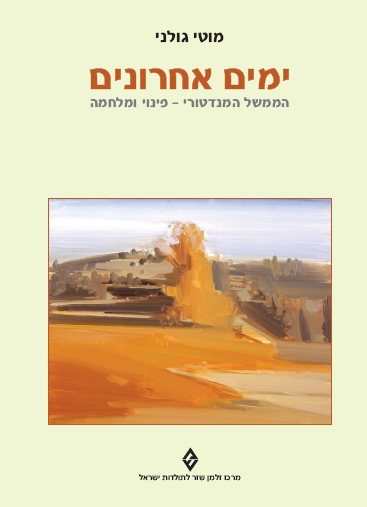The diary of the last Deputy High Commissioner was revealed for the first time in a book published by the historian Prof. Moti Golani, revealing that their departure from Israel was in fact an early version of secession

The British helped the people of the Jewish settlement to take control of the city of Haifa and their security areas in Jerusalem, but they did so out of a desire to protect their interest and not out of a pro-Jewish perspective, according to Prof. Moti Golani's new book focusing on Henry Gurney, the chief secretary of the mandatory regime in Israel Israel and the official number two after the High Commissioner.
Prof. Golani's book, which is currently being published by the Zalman Shazar Center, focuses on Gerani's personal diary beginning on March 15, 1948 and ending on May 14, 1948. According to Prof. Golani, Gerani himself wanted to publish the diary and even wrote a preface to it, However, he was murdered when he was sent to serve as High Commissioner in Malaya and the diary ended up in the archives, where it did not attract special attention until Prof. Golani came across it by chance, when he was working on a book about the last British High Commissioner. "The fact that the personal diary of a senior figure lay for so many years without reference means that no one cared how the British saw the last days of the mandate," noted Prof. Golani.
The main conclusion from the new book is that the British were faced with an impossible and forced task - on the one hand they were ordered to thin out their forces in preparation for the withdrawal and on the other hand they had to maintain law and order until their last day and all this in front of two sides who accuse them of being biased in favor of the other side and bringing up more And the level of violence. "From the diary emerges the image of a man who patronizes and condescends towards the Arabs and is infected with anti-Semitic views towards the Jews. Nevertheless, he managed to maintain fairness to both sides and the British interest. Although the British were barely able to defend themselves, nevertheless, in the days before the departure, they insisted on maintaining the good order until the very last moment. For example, they are not waiving the holding of matriculation exams and the provision of vaccinations", noted Prof. Golani.
According to Prof. Golani, the British interest was to end the mandate without special events. "The defense personnel promised the British a quiet evacuation of the enclave in Haifa. In return, the British gave them an exact schedule of departure and helped the Arab residents of Haifa who wanted to evacuate with the help of trucks and ships. In Jerusalem, the cooperation was closer, in exchange for the peace in the evacuation that the leaders of the settlement had promised through the Hagana, the British held a joint patrol of commanders and transferred their security zones in an orderly manner to the Jewish side," said the researcher, adding that the Arab side, who saw the British as pro-Zionists, did not understand the The British interest therefore chose to hinder instead of helping, which hurt him considerably.
"The British were on the verge of collapse. To this day, there is an opinion that they brought reinforcements in the last few days with the aim of staying, but from what Gerani writes in his diary and a lot of other archival material it appears that the reinforcements arrived only to protect the retreat. Since the UN forces that were supposed to arrive and take responsibility until the partition took place did not arrive, the British were forced to 'unilaterally secede' from the Land of Israel. The end of the mandate was actually a story of British disengagement", Prof. Golani concluded.

One response
Long live Moti Golan, God bless you.
A must read for anyone who was here during the last days of the mandate government.
The book brought me back to the war of liberation, to the battles for the liberation of Jerusalem in the Harel Brigade. The book was read with great interest, and describes for the first time the occurrence of events from the eyes of the British Mandate authorities.
Yitzhak Goldstein Kiryat Bialik